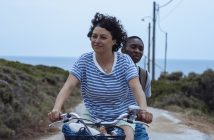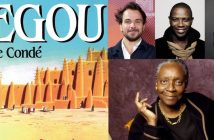Olivier Barlet: Bridget Pickering, we are in Cannes, at the Cannes Film Festival. Is that your first time in Cannes or have you been here before?
Bridget Pickering: I have been here a few times, this is my fourth or fifth time.
What’s your feeling this year?
Personally, for me, it’s quite a good year. It’s been an interesting year because when I first arrived, I came here with the project called Mama Africa, which was a series of films by female filmmakers, and I was one of the writers-directors but the product was being launched here so I really came to see what it was all about and get a sense of the environment.
You did a film in that project, didn’t you?
That’s right, it was called Uno’s World. Having been here a few other times, for me it’s one of the places where I think it is sort of easier to make connections with different people, form relationships which I think obviously is something that, as part of a producer working in South Africa, is very important because I think we are quite far, not physically, but in a way quite disconnected from what is going on in the world of film and culture, quite marginal. For me to be here, I’ve got a project that we’ve been working on for a very long time and over the years, it’s been trying to get money for it. In a way this is the first time I’ve come here where I felt that having meetings with people, there seems to be a real interest. When you bring a project from Africa, you inevitably think people won’t be interested, that’s your first assumption. When they are, it’s surprising: not everyone, but the one people who are interested are very interested. They say, it’s a good story, it’s a good script, you see the potential for this project.
What kind of project is that? Is that a big movie?
It’s an independent film. In South Africa, it’s an expensive film because it’s 1.5 million euro budget. Unfortunately in South Africa there isn’t enough of a critical mass of films where you can say, there are different levels. At the moment, we’ve had four, five films that get made. A film that was made recently was Confession of a gambler, for about 1 million, 1.5 million, that was a range. Then you have other bigger films which are maybe made for 10 or 15 million. But even if you make a film for 2 or 3 million, it’s very difficult to find that money.
Could you tell me a bit more about the project itself?
It’s a love story, set in Namibia. It’s the story of a woman who comes from Europe and has fallen in love with a Namibian farmer, someone who lives on a desert farm, and the farm has just experienced drought for quite a while and that has affected her psychologically and emotionally. Her husband believes that the rain will come but it doesn’t come so they decide that he has to go and find water with the animals. While she is waiting at home, a black man comes to help them find water, he’s a theologist and also a water diviner and he finds water and in the process of finding the water and being on the farm, he falls in love with the woman. On a purely textual level, it’s a love story between three people but obviously on another level, it’s very much a story about the colonial past, the relationship between these three people and what that means.
Looking for money, you get the reactions of people on the story. What are they?
I think people are very interested, they love the idea. People feel that it’s a story that also has mystical and spiritual elements because it’s about nature and how you, as a human being, if you’re looking for something to fulfil yourself and trying to find it through other people and how that doesn’t work and how you try and look for it. It’s also about the landscape and what that means, the physical landscape and also the emotional landscape and in the film the presentation of those will be very connected. The physical will very much be a reflection of the internal. People seem to respond very well, everyone loves the story. I think the most negative response we’ve had is that a sales agent said to us because there are too many black people in the film, she didn’t think people would be interested so we found that quite shocking (laugh) but other people have said that’s not true, if it’s a great story, that’s not an issue at all. I guess that’s the thing, that you will find very different opinions.
Do you do it as a producer or also as a filmmaker?
I’m the producer and the director is Richard Pakleppa, he made one of the Africa Dreaming films, which was called Sophia’s Homecoming.
You are from Namibia, where I guess the cinema world is small and very connected to South Africa.
Very, yes. Well, I live in South Africa now, my mother is South-African, a lot of my family has lived in South Africa and a lot of my family lives in Namibia because my parents are from both countries. I’ve worked in Namibia, I’m working in South Africa and I’m trying in a way to work in both places if I can. I do a lot of work in South Africa but also I see myself very much as a filmmaker that would like to work in the whole continent. I don’t see myself as a South African or Southern African filmmaker. I’m based in Johannesburg. In terms of my base, I’m a South African filmmaker but in terms of my storytelling, I feel very much that I’m interested in being part of the whole continent, I guess in a long-term way because there isn’t very much connections at the moment on the African continent, people are rather looking hard towards Europe rather than working with each other, I think that’s lacking.
You’ve been involved in the production of Hotel Rwanda as well. How was it, how did it work?
That was a very different project because it was very much developed and produced as a Hollywood film. When you work with a product like that, you have a very minimal role. In a way, I represented the South African money and obviously was part of the production but it does operate on a very different level. Normally, as a producer I work in a very intimate, on the ground, making decisions all the time but in Hotel Rwanda that just operated in very different ways because there’s so much money at stake and the politics of that particular filmmaking are very different.
Do you think that south-african cinema is too much connected with Hollywood?
I guess it’s inevitable, that South-Africa is more, because of the history, looking towards English-speaking countries, for inspiration or for connections and Hollywood obviously uses it a lot as a location so there’s a sort of connection. But I think in terms of an indigenous local voice, I don’t think that exists yet because it’s a very new country, it’s a country that is still trying to find its identity, people are very separated in how they live. There’s been a lot of division and trauma, so just trying to solve that as a country is already such a big thing and I think the films should reflect that we are struggling, that it’s a country struggling with its identity and also trying to find a voice, what sort of films should we be making and how should we make them. I’m not sure that people are actively doing that but I think that’s what we should be moving into, we should think more first about content and stylistically, what will constitute a South African film. At the moment I think it’s very derivative of with this British or American trying to just, not copy, but looking at those cinemas and replicating that. I do think there’s space for the local cinema to really develop and grow.
It is quite astonishing for us from outside, to see white filmmakers make films with black people not knowing their language. How do you feel about that?
It’s a very complicated thing and it happens a lot in South Africa, very much so. It happens and it’s done, and I think the films that are made are not our sort of good films. I think it’s more difficult to be spontaneous as a director if you’re not understanding the language. I guess it’s a result of the history of Africa.
Isn’t the industry still very white?
Absolutely. The growth and rise of black talent is very slow, they aren’t many and that’s for different reasons also. Filmmaking is very hard so for young people to do that, not to earn a living, life is tough at home, they don’t have families who can support them while they go to film schools, it’s very difficult. So for a young black filmmaker, it’s very tough to enter this industry because they have very little financial support or any support, and their families don’t really want to know why they want to do this.
But there are some. Suleman Ramadan, Thomas Mogatlane, Dumisani Phakathi etc. who make really good films. They’re more independent films, and television films also.
And they’re very good filmmakers. In South Africa, television really provides the everyday way to make a living. In a way, that’s also a bit the problem because if you work in television you consistently earn money from it, then to leave as an independent filmmaker is very difficult. But television work it’s not paying you enough so you can say one television project and then for three or four months I will try to develop my other film, you’re just never in that position. It’s always a struggle.
I was at the Durban Film Festival last year and I was impressed by all the young people who are gathered in the workshops, who really want to make films. There is also a politic which tries to grow the democracy of making films.
That’s right, very much so. The reality is not everybody can become a filmmaker, you hope out of the ten or twenty young people, one or two of them will really be passionate and keep doing it. But at all levels there’s definitely a very strong initiative to make young black people enter the industry. But it’s still hard because even if there are workshops, they still need to earn a living, to get experience. Part of you also has to know how to access information, even if it’s a camera. Just the ability to access things, it’s new for young people, if you come from a township and you are just struggling to survive. You don’t have Internet, maybe at best you have a cell phone, transport is hard, everything is difficult, it just becomes too much. Even though I think all these initiatives are good, for a young filmmaker it’s a very tough place.
Do you have opportunities to connect with this movement in your own work?
I do, not in a huge way. Obviously, if you’re invited to go speak to young people, you go, and we often have young people who come and work on our projects, almost like interns. Through that, we have connections.
Possibilities of training and so on.
Yes, obviously I think training is a big thing. It’s something that we all feel, that the industry feels very strongly about and just not only to create a diverse voice but for a new generation of filmmakers. For us to be a really true democracy, we have to insure that everyone has access to be able to make films or do whatever they need to do. For the democracy to really work, that is very important, that people don’t feel excluded.
In Durban, I talked with Eddie Mbalo about the perspectives for independent films in the country and he said : « Making commercial movies will give you the money to make the films you are passionate about ». Is that a perspective that can be really applied to South Africa?
The audience in South Africa is very problematic because people really watch television. The television is very good compared to anywhere else, especially in Africa, it’s a very good television. People really love television and it’s free so you can stay at home all day and watch very good programs. So for an independent filmmaker to make films outside of that, trying to find a new audience is very difficult and if the structures aren’t there, it means that you as a filmmaker have to start and of course it’s possible but you just don’t have the energy or the time so that has to happen on another level, people or the government, different institutions feel that we should get people to see South African films outside of television. I don’t think filmmakers have the ability or the resources to do that. When you’ve finished a film, you barely have the money to even distribute, to market the film so to then develop an audience. On another hand when you look at certain success story, obviously people mention the Nigerian model all the time in South Africa, also in Ethiopia you have a very strong distribution network, in Kenya, in Ghana, all these countries because they have very weak television station or the DVD market is incredibly strong and the films aren’t necessarily very good but people are interested in watching films about themselves so they somehow have created these audiences. South Africa is much more different. There’s a formal system that’s already in place and that people are attached to. To pull them away from that into something else and say, « On a Friday night, you need to spend money to go to the cinema and on drinks », I don’t think it’s something filmmakers can do.
I was looking for South African films in DVD shops but found only the white successful comic Leo Schuster.
My films don’t exist in the public space either, so that is a big problem.
Does it mean that when you produce a film you have to think that without the television, it’s out and anyway on the local market, you can’t really make money so you have to export the film?
It depends what kind of film it is. The South African films do very badly at the box-office, Tsotsi did well, obviously, people knew about it, it won an Oscar. In fact those sort of films, like Forgiveness and all of that, if they’ve done any business, which I don’t think they have, it’s internationally, with TV stations here and there, festivals. Or they play at the art-house cinema for a week or two. It’s almost impossible to guarantee money from the local market.
What about your project, how do you want to market it?
I think for us, it’s definitely a film that we imagine playing in art-house cinemas. That’s the way the film has been constructed and that’s how we see it. We imagine it’s the kind of film that will play not only in South Africa, also internationally, and in festivals. It’s not going to be a film that young people or the majority of people will want to see, but I do think there’s potential.
Is Nollywood a model for South Africa ?
Nigerian films are doing incredibly well. There’s an opportunity to do the same, maybe not the same economy, maybe something slightly better because also the South African middle class is increasing, people are interested in other taste. I think there’s an opportunity to create another quality but also very authentic in the local language films and I guess borrow from other cinemas around the world which we have been doing, with the Mexican cinema or Brazilian cinema.








